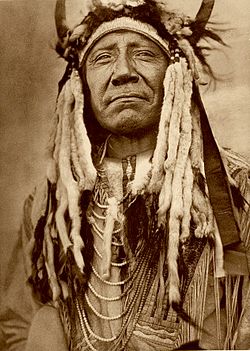Two Moons
| Two Moon | |
|---|---|
| Ishaynishus, Éše'he Ôhnéšesêstse | |

Two Moon (Credit: Northwestern University Library Edward S. Curtis's The North American Indian, 2003).
|
|
| Cheyenne leader | |
| Personal details | |
| Born | 1847 Montana |
| Died | 1917 |
| Resting place | Alongside U.S. Route 212, west of Busby, Montana |
| Parents | Father, Carries the Otter |
| Known for | Participation in the Battle of the Rosebud, Battle of Little Big Horn, and the Battle of Wolf Mountain; Indian Scout; Chief of the Cheyenne Northern Reservation |
Two Moons (1847–1917), or Ishaynishus (Cheyenne: Éše'he Ôhnéšesêstse), was one of the Cheyenne chiefs who took part in the Battle of the Little Bighorn and other battles against the United States Army.
Two Moons was the son of Carries the Otter, an Arikara captive who married into the Cheyenne tribe. Perhaps known best for his participation in battles such as the Battle of the Rosebud against General Crook on June 17, 1876, in the Montana Territory, the Battle of Little Big Horn on June 26, 1876 and what would prove to be his last battle which was that of the Battle of Wolf Mountain on January 8, 1877. Two Moons' defeat in the battle at Wolf mountain by General Nelson A. Miles would inevitably lead to the surrender of his Cheyenne band at Fort Keogh in April, 1877.
After the surrender of the Cheyenne band he led in 1877, Two Moons chose to enlist as an Indian Scout for the same General, Nelson A. Miles to whom he had not long since surrendered. As a result of Two Moons' pleasant personality, the friendliness that he showed towards the whites as well as his ability to get along with the military, General Miles appointed him head Chief of the Cheyenne Northern Reservation. As head Chief, Two Moons would prove to play a crucial role in facilitating the surrender of Chief Little Cow's Cheyenne band to Fort Keogh.
Two Moons traveled on multiple occasions to Washington, D.C., to discuss and fight for the future of the Northern Cheyenne people and to better the conditions that existed on the reservation. In 1914, Two Moons met with President Woodrow Wilson to discuss these matters.
...
Wikipedia
